高中英语语法:反义疑问句专项讲解(含答案)
反义疑问句详解及练习和答案
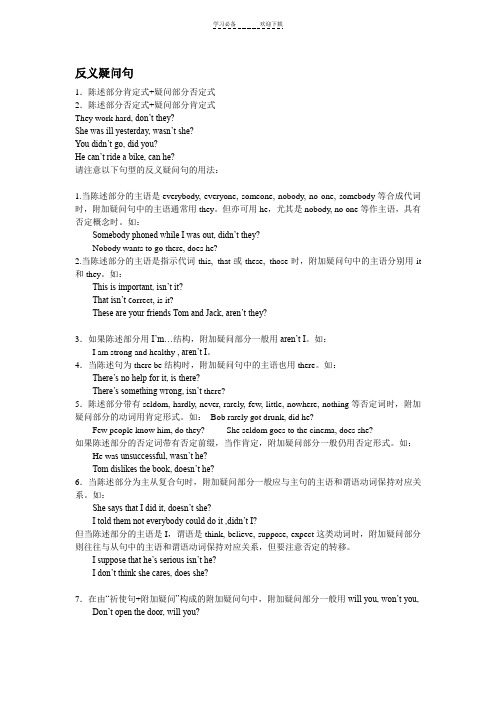
反义疑问句1.陈述部分肯定式+疑问部分否定式2.陈述部分否定式+疑问部分肯定式They work hard, don’t they?She was ill yesterday, wasn’t she?You didn’t go, did you?He can’t ride a bike, can he?请注意以下句型的反义疑问句的用法:1.当陈述部分的主语是everybody, everyone, someone, nobody, no one, somebody等合成代词时,附加疑问句中的主语通常用they。
但亦可用he,尤其是nobody, no one等作主语,具有否定概念时。
如:Somebody phoned while I was out, didn’t they?Nobody wants to go there, does he?2.当陈述部分的主语是指示代词this, that或these, those时,附加疑问句中的主语分别用it 和they。
如:This is important, isn’t it?That isn’t c orrect, is it?These are your friends Tom and Jack, aren’t they?3.如果陈述部分用I’m…结构,附加疑问部分一般用aren’t I。
如:I am strong and healthy , aren’t I。
4.当陈述句为there be结构时,附加疑问句中的主语也用there。
如:There’s no help for it, is there?There’s something wrong, isn’t there?5.陈述部分带有seldom, hardly, never, rarely, few, little, nowhere, nothing等否定词时,附加疑问部分的动词用肯定形式。
反义疑问句讲解及习题及答案

知识梳理句型解释1.陈述部分肯定式+疑问部分否定式可记为前肯后否2.陈述部分否定式+疑问部分肯定式可记为前否后肯主语一般词语附加疑问句中主语用和主语一致的主语,用主格。
不定代词当陈述部分的主语是( 1 )用one 时,后面的疑问句可用one/he.(2)everything,anything,nothing,something时,附加疑问句中主语用it 不用they(3)this,that,或those,these时,附加疑问句中主语用it和they.(4)everyone,everybody,someone,somebody等,附加疑问句中主语一般用he/they.(5)不定式,动名词,其他短语,附加疑问句中主语一般用it。
(6)在there be句型中,附加疑问句中主语一般用be/情态动词/助动词+there。
特殊句型否定意义的词否定意义的词(1)当陈述部分有never,seldom, hardly,few,little,barely, scarcely, nothing 等否定意义的词时,后面的反意疑问句则为肯定形式:There are few apples in the basket, are there?He can hardly swim, can he?They seldom come late, do they?(2)当陈述部分含有否定意思的词是unhappy,dislike,unfriendly等含有否定词缀的派生词,也就是有un-前缀、-less后缀等含有词缀而意思否定的词,当做肯定句处理,疑问部分要用否定形式。
如:He looks unhappy,doesn't he?他看上去不高兴,不是吗?The girl dislikes history,doesn't she?这女孩不喜欢历史,不是吗?有less,fewer等词视为肯定词,疑问部分用否定形式。
如:There will be less pollution, won't there?表示主语主观意愿的词含有think, believe, suppose, imagine, expect等动词后接宾语从句构成的主从复合句在构成反意疑问句时,视情况不同有两种不同的构成方式。
(完整版)反义疑问句讲解及答案

反义疑问句一.句型解释反义疑问句(The Disjunctive Question):即附加疑问句。
它表示提问人的看法,没有把握,需要对方证实。
反义疑问句由两部分组成:前一部分是一个陈述句,后一部分是一个简短的疑问句,两部分的人称时态应保持一致。
1.陈述部分肯定式+疑问部分否定式2.陈述部分否定式+疑问部分肯定式She was ill yesterday, wasn’t she?You didn’t go, did you?二.特殊的句型1.祈使句。
祈使句后一般加上will you或won't you构成反意疑问句,用will you 多表示“请求”,用won't you 多表示提醒对方注意。
例如:Let引导的祈使句有两种情况:1) Let's...,后的反意疑问句用shall we或shan't we。
例如:Let's go home, shall we/ shan't we? 回家吧,好吗?2)Let us/me...后的反意疑问句用will you或won't you。
例如:Let me have a try, will you/won't you?3)祈使句都用will you 或won’t you2.当陈述部分含I think (believe, suppose...)that... 结构时,其反意疑问句须与从句的主、谓语保持一致,注意主句的主语必须是第一人称。
例如:I don't think he will come, will he?若是非第一人称,则与主句的主语相一致He thinks that she will come, doesn’t he?反意疑问句的陈述部分为I(We) don’t think(believe, suppose, consider)+ that从句时,从句为否定意义,问句部分的动词和主语仍与that从句保持一致且用肯定式。
高中英语语法:反义疑问句专项讲解(含答案)
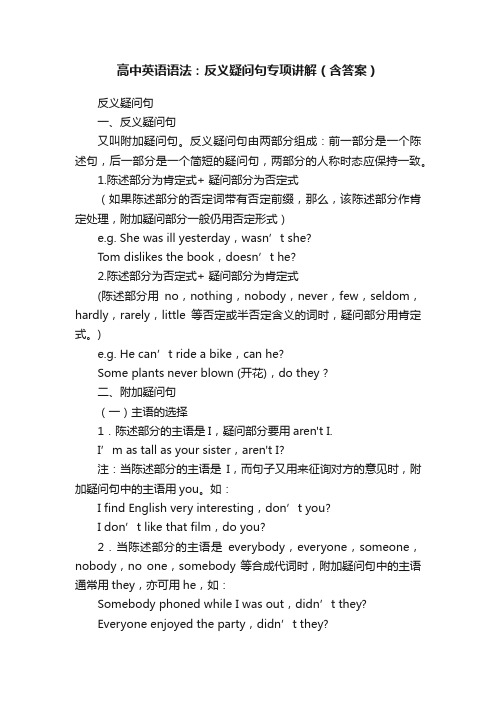
高中英语语法:反义疑问句专项讲解(含答案)反义疑问句一、反义疑问句又叫附加疑问句。
反义疑问句由两部分组成:前一部分是一个陈述句,后一部分是一个简短的疑问句,两部分的人称时态应保持一致。
1.陈述部分为肯定式+ 疑问部分为否定式(如果陈述部分的否定词带有否定前缀,那么,该陈述部分作肯定处理,附加疑问部分一般仍用否定形式)e.g. She was ill yesterday,wasn’t she?Tom dislikes the book,doesn’t he?2.陈述部分为否定式+ 疑问部分为肯定式(陈述部分用no,nothing,nobody,never,few,seldom,hardly,rarely,little等否定或半否定含义的词时,疑问部分用肯定式。
)e.g. He can’t ride a bike,can he?Some plants never blown (开花),do they ?二、附加疑问句(一)主语的选择1.陈述部分的主语是I,疑问部分要用aren't I.I’m as tall as your sister,aren't I?注:当陈述部分的主语是I,而句子又用来征询对方的意见时,附加疑问句中的主语用you。
如:I find English very interesting,don’t you?I don’t like that film,do you?2.当陈述部分的主语是everybody,everyone,someone,nobody,no one,somebody 等合成代词时,附加疑问句中的主语通常用they,亦可用he,如:Somebody phoned while I was out,didn’t they?Everyone enjoyed the party,didn’t they?Nobody wants to go there,does he?3.当陈述部分的主语是不定代词everything,nothing,anything,something时,附加疑问句中的主语一般用it,如:Everything seems all right now,d oesn’t it?Nothing is kept in good order,is it?Something must be done to stop pollution,isn’t it?4.当陈述部分的主语是指示代词this,that或these,those时,附加疑问句中的主语分别用it和they,如:This is important,isn’t it?That isn’t correct,is it?These are your friends Tom and Jack,aren’t they?5.如果陈述部分是以代词one作主语,附加疑问句中的主语在正式场合用one,非正式场合下可以用you或he,如:One can’t be too careful,can one?或can you?One should do his duty,shouldn’t he?6.当陈述句为there be结构时,附加疑问句中的主语也用there。
英语语法:反义疑问句专项讲解
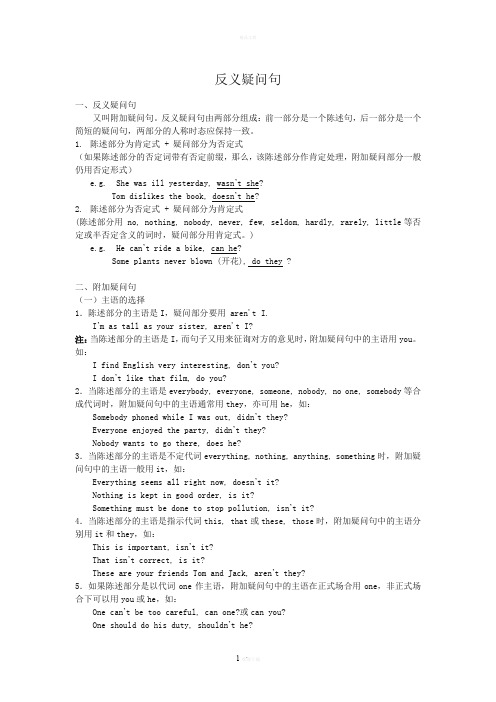
反义疑问句一、反义疑问句又叫附加疑问句。
反义疑问句由两部分组成:前一部分是一个陈述句,后一部分是一个简短的疑问句,两部分的人称时态应保持一致。
1.陈述部分为肯定式 + 疑问部分为否定式(如果陈述部分的否定词带有否定前缀,那么,该陈述部分作肯定处理,附加疑问部分一般仍用否定形式)e.g. She was ill yesterday, wasn’t she?Tom dislikes the book, doesn’t he?2.陈述部分为否定式 + 疑问部分为肯定式(陈述部分用 no, nothing, nobody, never, few, seldom, hardly, rarely, little等否定或半否定含义的词时,疑问部分用肯定式。
)e.g. He can’t ride a bike, can he?Some plants never blown (开花), do they ?二、附加疑问句(一)主语的选择1.陈述部分的主语是I,疑问部分要用 aren't I.I’m as tall as your sister, aren't I?注:当陈述部分的主语是I,而句子又用来征询对方的意见时,附加疑问句中的主语用you。
如:I find English very interesting, don’t you?I don’t like that film, do you?2.当陈述部分的主语是everybody, everyone, someone, nobody, no one, somebody等合成代词时,附加疑问句中的主语通常用they,亦可用he,如:Somebody phoned while I was out, didn’t they?Everyone enjoyed the party, didn’t they?Nobody wants to go there, does he?3.当陈述部分的主语是不定代词everything, nothing, anything, something时,附加疑问句中的主语一般用it,如:Everything seems all right now, doesn’t it?Nothing is kept in good order, is it?Something must be done to stop pollution, isn’t it?4.当陈述部分的主语是指示代词this, that或these, those时,附加疑问句中的主语分别用it和they,如:This is important, isn’t it?That isn’t correct, is it?These are your friends Tom and Jack, aren’t they?5.如果陈述部分是以代词one作主语,附加疑问句中的主语在正式场合用one,非正式场合下可以用you或he,如:One can’t be too careful, can one?或can you?One should do his duty, shouldn’t he?6.当陈述句为there be结构时,附加疑问句中的主语也用there。
反义疑问句详细讲解及习题及答案-反意疑问句-反义疑问句题目及答案解析
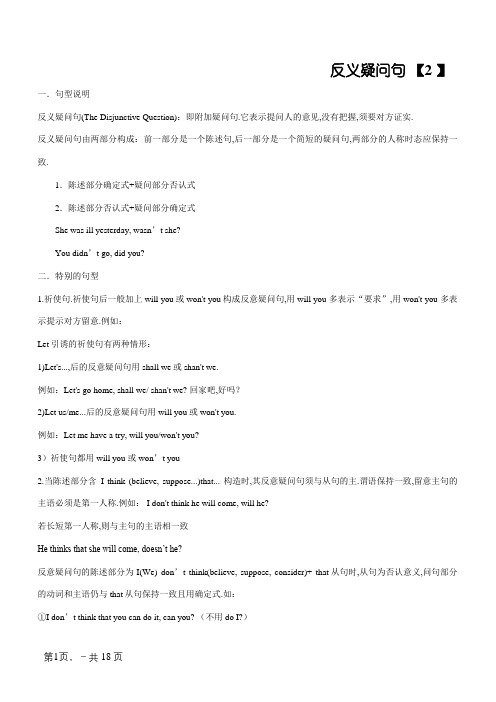
反义疑问句【2 】一.句型说明反义疑问句(The Disjunctive Question):即附加疑问句.它表示提问人的意见,没有把握,须要对方证实.反义疑问句由两部分构成:前一部分是一个陈述句,后一部分是一个简短的疑问句,两部分的人称时态应保持一致.1.陈述部分确定式+疑问部分否认式2.陈述部分否认式+疑问部分确定式She was ill yesterday, wasn’t she?You didn’t go, did you?二.特别的句型1.祈使句.祈使句后一般加上will you或won't you构成反意疑问句,用will you 多表示“要求”,用won't you 多表示提示对方留意.例如:Let引诱的祈使句有两种情形:1)Let's...,后的反意疑问句用shall we或shan't we.例如:Let's go home, shall we/ shan't we? 回家吧,好吗?2)Let us/me...后的反意疑问句用will you或won't you.例如:Let me have a try, will you/won't you?3)祈使句都用will you 或won’t you2.当陈述部分含I think (believe, suppose...)that... 构造时,其反意疑问句须与从句的主.谓语保持一致,留意主句的主语必须是第一人称.例如: I don't think he will come, will he?若长短第一人称,则与主句的主语相一致He thinks that she will come, doesn’t he?反意疑问句的陈述部分为I(We) don’t think(believe, suppose, consider)+ that从句时,从句为否认意义,问句部分的动词和主语仍与that从句保持一致且用确定式.如:①I don’t think that you can do it, can you? (不用do I?)②We don’t believe that the news is true, is it? (不用do we?)反意疑问句的陈述部分为主语+said( told, reported, asked……) + that从句时,问句部分的动词和主语与陈述部分的主句动词和主语保持一致.如:①They said that you had finished your work, didn’t they? (不用hadn’t you)②Kate told you that she would go there, didn’t she? (不用wouldn’t she?)3.当反意疑问句的陈述部分为从句时,若主句主语为I ,反意部分的主语为从句主语;若不为I ,反义部分的主语为主句主语.①I know your father is a worker, isn't he?①she knows your father is a worker, doesn’t she?4.当陈述部分含有以下这些含有否认意义的词时:few, little, seldom,hardly, never, not, no, no one, nobody, nothing, none, neither等,其反意疑问句需用确定构造.例如: He is never late for school, is he?5.当陈述部分所含的否认词是经由过程加前缀或后缀构成的,厥后的反意疑问句依旧用否认构造.例如:It is unfair, isn't it? 这不公正,是吧?6.陈述部分主.谓语是I am...时,反意疑问句用aren't I ,而不是am not I (可用am I not).例如:I'm working now, aren't I? 我在工作,是吗?7. 陈述部分的主语是 everybody, everyone, anybody, anyone, somebody, someone, nobody, no one, none, neither 时, 其反意疑问句的主语需用复数代词they.例如:Everyone is here, aren't they? 大家都到了,是吗?No one knows about it, do they? 没有人知道这件事,对吗?8.陈述部分的主语是everything, nothing, anything或something 时,反意疑问句的主语运用代词it.例如:Something is wrong with my radio, isn't it?我的收音机出缺点了,是吧?9.陈述部分的主语是指导代词this或that时,反意疑问句的主语用it,当陈述部分的主语是指导代词these或those 时,其反意疑问句的主语用they.例如:This is a plane, isn't it? 这是一架飞机,是吗?These are grapes,aren't they? 这些是葡萄,是吗?10.陈述部分的主语是不定代词one时,反意疑问句的主语可以用one,也可用you.例如:One should be ready to help others, shouldn't one?每小我都应当乐于助人,是吧?11. 当陈述部分谓语动词是need, dare,且这些词被用作实义动词时,其反意疑问句需用do的恰当情势.例如:He needs help, doesn't he?他须要关心,是吗?12.当陈述部分主语是从句.不定式(短语).动词-ing情势时,反意疑问句的主语应当用it.例如:What you need is more important, isn't it?你须要的器械更主要,是吧?12.have(has)不是表示“有”的意思,并在句中做谓语时,其反意疑问句的助动词要用do, does, did.例如:They had a meeting just now,didn't they?他们适才开了个会,是吗?15.陈述部分有have to 时,其反意疑问句要用助动词的否认情势.例如:You have to water the vegetables every day, don't you?You had to water the vegetables every day, didn't you?16.He used to stay up late, usedn’t he/ didn’t he?17.陈述部分是there be句型时,其反意疑问句中要用there.There was a hospital here, wasn't there?18.陈述部分有had better时,反意疑问句中要用hadn't.例如:We’d better go to school at once, hadn't we?He’d rather go home, wouldn’t he?19.当陈述部分含有情态动词must时,我们便要剖析一下must的寄义.假如must 作“必定;要;必须”讲,反意疑问句须用mustn't或needn't;而当must作推想意义“必定是;必定”讲时,反意疑问句则需依据must后的动词本相选用响应的情势.例如: He must work hard at physics, mustn't he?他必须尽力学物理,是吧?Tom must be at home,isn't he? 汤姆必定在家,是吧①He might have forgotten his pen in the classroom yesterday, didn’t he?(不用mightn’t he?/ hasn’t he?)②You must have got up late this morning, didn’t you?(不用mustn’t you?/haven’t you?)20.反意疑问句的答复用yes, no, 但是,答复意思相反,当陈述部分是否认情势时,答复要按事实.例如:They don’t work hard, do they?Yes, they do. 不,他们工作尽力./No, they don’t. 对, 他们工作不尽力.反意疑问句的陈述部分为I am……时,问句部分习惯上用aren’t I?表示.如:I am a very honest man, aren’t I?反意疑问句二反意疑问句是英语四大问句之一,它是由一个陈述句加上一个短问句而构成的.反意疑问句的根本构成情势是:陈述句+动词(确定或否认)+主语?如:①She often has lunch at school, doesn’t she? ②You don’t like sports, do you?一. 反意疑问句中问句部分的动词与陈述部分的动词在语气上成相反的对应关系,即:确定+否认?否认+确定?如:①You can’t do it, can you? ②They are very late for the meeting, aren’t they?二.反意疑问句中问句部分的动词与陈述部分的动词种类要对应一致.如:①He has supper at home every day, doesn’t he? (不能用hasn’t he?)②They have known the matter, haven’t they? (不能用don’t they?)三.反意疑问句中问句部分的动词在时态上应和陈述部分的时态一致.如:①They will go to town soon, won’t they?(不能用don’t they?或aren’t they?)②He works very hard, doesn’t he?(不能用didn’t he?或won’t he?)四.反意疑问句的陈述部分带有little, few, never, hardly, seldom等否认意义的词时,问句部分用确定式.如:①She never tells a lie, does she?(不用doesn’t she?)②He was seldom late, was he?(不用wasn’t he?)五.反意疑问句的陈述部分含有由un-, im-, in-, dis-, 等否认意义的前缀构成的词语时,陈述部分要视为确定寄义,问句部分用否认情势.如:①Your father is unhappy, isn’t he?(不能用is he?)②The man is dishonest, isn’t he? (不能用is he?)六.反意疑问句的陈述部分为I am……时,问句部分习惯上用aren’t I?表示.如:I am a very honest man, aren’t I?八.反意疑问句的陈述部分为I(We) don’t think(believe, suppose, consider)+ that从句时,从句为否认意义,问句部分的动词和主语仍与that从句保持一致且用确定式.如:①I don’t think that you ca n do it, can you? (不用do I?)②We don’t believe that the news is true, is it? (不用do we?)九.反意疑问句的陈述部分为非第一人称主语+ think(believe, suppose, consider) + that从句时,问句部分的动词和主语与陈述部分的主句动词和主语保持一致.如:①They all think that English is very important, don’t they? (不用isn’t it?)②He didn’t think that the news was true, did he? (不用wasn’t/ was it?)十.反意疑问句的陈述部分为主语+said( told, reported, asked……) + that从句时,问句部分的动词和主语与陈述部分的主句动词和主语保持一致.如:①They said that you had finished your work, didn’t they? (不用hadn’t you)②Kate told you that she w ould go there, didn’t she? (不用wouldn’t she?)十一.陈述部分的主语为不定代词something, anything, nothing, everything时,问句部分的主语用it.如:①Something is wrong with the computer, isn’t it?②Nothing has happened to them, has it?十二.陈述部分的主语为不定代词somebody(someone), anybody(anyone), nobody(no one), everybody(everyone)时,问句部分的主语用he或 they,这时问句动词的数应和he或 they一致.如:①Someone has taken the seat, hasn’t he?②Everyone has done their best in the game, haven’t they?十三.陈述部分为Let me……时,问句部分习惯上用shall I? 或will you?情势.如:Let me have a try, shall I?(will you?)十四.陈述部分为Let us……时,问句部分习惯上用will you? 陈述部分为Let’s……时,问句部分习惯上用shall we?如:Let us stop to rest, will you?Let’s go home together, shall we?十六.陈述部分用上述情形以外的祈使句时,问句部分一般用will you?情势表示要求,用won’t you?情势表示委婉要求或邀请.如:①Do sit do wn, won’t you?/ will you? ②Jim,you feed the bird today, will you?③Please open the window, will you?(won’t you?)十七.陈述部分为否认祈使句时,问句部分一般用will you?如:Don’t make any noise, will you?十八.陈述部分为There (Here) + be + 主语时,问句部分用动词+there(here)?.如:①There are two cak es on the plate, aren’t there?②Here is a story about Mark Twain, isn’t here?十九.陈述部分用had better +本相动词表示建议时,问句部分用hadn’t +主语?.①You’d better tell him about the matter, hadn’t you?②We had better do it by ourselves, hadn’t we?二十.陈述部分用used to +主语时,问句部分用didn’t + 主语?或usedn’t①He used to live in the country, didn’t he?/usedn’t he?②They used to be good friends, didn’t they?/usedn’t they?二十一.陈述部分用must(may, might) + have + V-ed表示推想时,若句中带有显著的曩昔时光的状语,问句部分动词用曩昔时情势.如:①He might have forgotten his pen in the cla ssroom yesterday, didn’t he?(不用mightn’t he?/ hasn’t he?)②You must have got up late this morning, didn’t you?(不用mustn’t you?/haven’t you?)二十二.陈述部分用must(may, might) + have + V-ed表示推想时,若句中没有带显著的曩昔时光的状语,问句部分动词用如今完成时情势.如:①Everyone must have known the death of the waitress, haven’t they? (不用mustn’t they?)②You must have worked there a year ago, didn’t you?(不用mustn’t you?/ haven’t you?)二十三.陈述部分的主语为从句时,问句部分的主语一般用it代替,如:①What he said is true, isn't it? (不用didn’t he?)②Where we will build the dam has not been decided yet, has it? (不用won’t we?)二十四.陈述部分的主语为动名词或不定式时,问句的主语用it代替.如:①To do one good deed is easy for a person, isn't it?②Skating is your favorite sport, isn't it?反意疑问句考点反意疑问句是高考主要考点,其构成情势是"确定 + 否认"和"否认 + 确定",但也有一些特例.本文联合高测验题,对反意疑问句的易考点进行归纳.1. 陈述句部分的谓语是be, had better或情态动词等时,反意疑问句仍用这些动词.[原题再现]Bill's aim is to inform the viewers that cigarette advertising on TV is illegal, ________?A. isn't itB. is itC. isn't heD. is he答案: A2. 陈述部分的谓语是have时,若have作"有"解,反意疑问部分用have (has) 或do (does)的确定或否认式; 若have作使役动词,则只能用do (does, did)的恰当情势进行反问.[原题再现]His wife had the front door painted green yesterday, ________she?A. didB. hadC. didn'tD. hadn't答案: C3. 陈述部分含有no, never, seldom, hardly, few, little, nowhere, nothing等否认意义的词时,反意疑问部分用确定情势;但陈述部分若运用含有否认意义的前缀或后缀的词时,反意疑问部分仍然运用否认情势.[原题再现]He seldom has lunch at school, ________?A. hasn't heB. has heC. doesn't heD. does he答案: DThey dislike English, don't they? 他们不爱好英语,不是吗?4、含有下列情态动词时构成的反意疑问句情势a.陈述句有had better时,问句顶用had (hadn’t) .You’d better go home now, hadn’t you?b.陈述句中有 must表示“必须”时问句用 needn't或 mustn'tYou must do your homework, mustn't you?/ needn't you?We mustn’t go home, must (need) we?c.must表示“推想”时,问句中则不能用情态动词,而须要用其它情势.如:She must be in the room, isn’t she?You must have been to Shanghai, haven’t you?[原题再现]There is no light in the dormitory. They must have gone to the lecture, ________?A. didn't theyB. don't theyC. mustn't theyD. haven't they答案: D5. 陈述部分的主语是everyone, everybody, anyone, anybody, someone, no one等不定代词时,其疑问部分的主语可依据句子的内在选用he或they.例如:Everyone knows his job, doesn't he?Everyone had lent you a hand when you were in trouble, hadn't they?6. 陈述部分的主语是something, anything, everything, nothing等不定代词,其疑问部分的主语一般用it.例如: Everything is ready, isn't it?Nothing goes well, does it?7. 陈述部分是there be句型时,反意疑问部分用"...there?".[原题再现]There's not much news in today's paper, ________?A. isn't itB. are thereC. is thereD. aren't there答案: C8. 陈述部分谓语含有used to时,反意疑问部分可用usedn't,也可用didn't;陈述部分含有ought to时,反意疑问部分可用oughtn't或shouldn't两种情势.例如:Tom used to make fun of Peter, usedn't / didn't he?We ought to learn the law knowledge by heart, oughtn't / shouldn't we?9. 陈述部分的主语是this, that,不定式短语.动名词短语或从句时,反意疑问部分的主语用it;陈述部分的主语是these, those时,反意疑问部分的主语用they.例如:This is a most wonderful place, isn't it?Learning a foreign language well takes a long time, doesn't it?That they are close friends doesn't seem true, does it?10. 陈述部分的主语后有同位语从句或定语从句润饰时,反意疑问部分仍应对主句主语进行反问.[原题再现]The news that they failed their driving test discouraged him, ________?A. did theyB. di dn't theyC. did itD. didn't it答案: D11. 陈述部分为含有宾语从句的主从复合句时,平日要对主句主语进行反问;但若陈述部分是"I (don't) think / suppose / believe / imagine / expect等 + 宾语从句"时,要对宾语从句的主语进行反问,同时要留意否认转移现象.[原题再现]I don't suppose anyone will volunteer, ________?A. do IB. don't IC. will theyD. won't they答案: C12. 陈述部分为祈使句时,不论祈使句是确定情势照样否认情势,反意疑问部分平日用will you;但Let's引起的祈使句的反意疑问句部分平日用shall we.[原题再现]If you want help-money or anything, let me know, ________ you?A. don'tB. willC. shallD. do答案: B13.陈述句部分是"I wish…"句型时,附加问句部分用may I.例如:I wish I were you, may I? 我愿望我是你,可以吗?I wish her to come here, may I? 我愿望她到这儿来,可以吗?猜测题1.Nobody says a word about the incident, ___________?A. is he B. doesn’t he C. do they D. don’t they2.You neve r told me why you were late for the class, ___________?A. weren’t you B. didn’t you C. had you D. did you3.They dare not call you a fool, ___________?A. would they B. dared they C. dares they D. dare they4.There is not much news in today’s paper, _____________?A. isn’t it B. are there C. is there D. aren’t there5.The manager came here in a car, ________?A. was he B. did he C. wasn’t he D. didn’t he6.She must have arrived there yesterday, _________?A. have she B. must she C. didn’t she D. mustn’t she7.Peter hardly ever goes to parties, _______?A. doesn’t he B. do he C. does he D. is he8.What a lovely day, _________?A. doesn’t it B. isn’t it C. shan’t it D. hasn’t it9.Let me do it, _______?A. shall I B. shall weC. will you D. will I10.Nothing he did was right, ___________?A. did he B. was it C. didn’t it D. was he11.There used to be a church behind the cemetery,________?A. didn’t there B. used there C. usedn’t itD. didn’t it12.He must be in the library now, ________?A. doesn’t he B. mustn’t he C. needn’t he D. isn’t he13.You would rather not have fish, _________ you?A. hadn’t B. wouldn’t C. would D. had14.----You are not a new member, are you? ---- _________. I joined only yesterday.A. No, I’m not B. Yes, I’m not C. No, I am D. Yes, I am15.My sister often ne eds help with her study, _______?A. need she B. needn’t she C. does she D. doesn’t she16.You’d better send for a doctor for your mother, ________ you?A. had B. hadn’t C. would D. wouldn’t17.Let’s go swimming, _________?A. aren’t we B. shall we C. will you D. won’twe18.Li Ming can’t be in the classroom, __________?A. can he B. is he C. can’t he D. must he19.He ought to have looked after his father, _________?A. oughtn’t he B. ought he not to C. oughtn’t he to D. oughtn’t to he20.I have nothing to do with the matter, ________?A. have I B. has it C. do I D. does it21.He was in good heath when I saw him last time, _________?A. wasn’t he B. didn’t he C. hadn’t he D. hasn’t he22.John had his hair cut yesterday afternoon, ________?A. haven’t he B. didn’t he C. hadn’t he D. hasn’t he23.None of the pupils attended the sports meet, ________?A. did they B. do they C. didn’t they D. don’t they24.I’d like to go with you,_______?A. had I B. wouldn’t I C. hadn’t I D. would I25.It is the third time that John has been late, ______?A. hasn’t he B. isn’t he C. isn’t it D. hasn’t it26.I suppose he is serious, ________?A. do I B. don’t I C. is he D. isn’t he27.She dislikes this skirt, _________?A. doesn’t she B. does she C. isn’t she D. is she28.You mustn’t tell it to your mother, ________?A. must you B. do you C. need you D. will you29.They have to face the difficulty,________?A. haven’t they B. don’t they C. do they D. must they30.The man in blue must be your brother,_______?A. mustn’t he B. needn’t he C. isn’t he D. is he答案与提示: 1.C当陈述部分中的主语为everybody, everyone, someone, no one, nobody, somebody等不定代词时,反意疑问句部分中的主语常用they.且陈述部分为否认意义的词nobody, 反意疑问部分运用确定情势.2.D当陈述部分是主从复合句时,反意疑问部分中的动词和主语代词平日应和主句中的动词和主语保持一致.3.D当陈述部分中含有情态动词dare 时,反意疑问部分也运用情态动词dare(没有人称和数的变化)4.C 陈述句部分含有not,是否认式,所以反意疑问部分运用确定式.并且当陈述部分是there be构造时,反意疑问部分用there,省略主语代词.5.D当陈述部分的动词是行动动词时,并且前面又没有任何助动词时,这时的疑问部分要用do/does/did.6.C假如must have done句式中的时光状语为表示曩昔的时光的词,如last year, yesterday, the day before yesterday等,反意疑问部分常用didn’t + 主语.7.C假如陈述部分已有表示否认意义的副词,如never, nothing, seldom, rarely, hardly等时,反意疑问部分运用确定情势.8.B当陈述句部分为感慨句时,反意疑问句部分常用否认情势,且问句部分的动词常用be.9.C当陈述部分是祈使句时,反意疑问部分常用will you.10.B当陈述部分的主语是everything, anything, nothing, something等表物的不定代词时,反意疑问部分的主语常用it.11.A 当陈述部分是there be构造时,反意疑问部分用there,省略主语代词.当陈述部分含有情态动词used to时,反意疑问部分可用used to情势或did情势.所以此空应填didn’t there 或usedn’t there.12.D must/ may/ can’t + do 表示对如今情形的推想,反意疑问部分用一般如今时.He must be in the library now.相当于I think he is in the library now.13.C当陈述句部分含had better/best, would like to, would rather等商定俗成特别短语时,反意疑问部分应保留第一个词.如斯题中的陈述部分含有would rather的否认式,则反意疑问部分用would.14.D反意疑问句的答语应依据现实情形来答复,假如事实是确定的,前面要用yes,不然用no.答复中的确定否认关系可以用下面这个公式表示:(+表示确定,-表示否认)问句中:+,-或-,+答复中:+,+或-,-15.D陈述句部分含有实义动词needs, 所以反意疑问部分要用助动词doesn’t.16.B当陈述部分有had better时,反意疑问部分运用hadn’t.17.B当陈述部分是祈使句时,反意疑问部分常用will you. 但以Let’s 开首的祈使句,反意疑问部分常用shall we.以Let us开首的祈使句,反意疑问部分常用will you.18.B当陈述部分含有情态动词must, may, can’t, 且表示推想时,反意疑问部分不能用must, may, can’t自身,应和后面的实义动词保持一致. Ling Ming can’t be in the classroom.相当于:I don’t think Li Ming is in the classroom.19.A当陈述部分含有情态动词ought to时,反意疑问部分常用oughtn’t.20.C本题中的陈述部分中的have是实义动词,不作“有”解,所以反意疑问部分应需借助助动词do, does, did等来完成.21.A当陈述部分是主从复合句时,反意疑问部分中的动词和主语代词平日应和主句中的动词和主语保持一致.此题的主句是:He was in good health.22.B本题中的陈述部分中的had是实义动词,不作“有” 解,所以反意疑问部分应需借助助动词did来完成.23.A当陈述部分的主语是everybody, everyone, someone, none, nobody, somebody等不定代词时,反意疑问句部分中的主语常用they.本题中的陈述句部分用的一般曩昔时态.24.B当陈述部分中有would like时,反意疑问部分运用wouldn’t.25.C当陈述句部分是强调句或相似强调句的构造时,反意疑问部分常和句首的It is/was 保持一致.26.D当陈述部分的主句是I suppose, I think, I believe, I imagine等构造时,反意疑问部分往往与从句保持一致,并且要留意否认转移.27.A当陈述部分中含有im, in, dis, un等否认前缀或less等否认后缀时,应把陈述部分算作是确定的,反意疑问部分要用否认式.28.A当陈述部分含有情态动词mustn’t表示“制止”时,反意疑问部分常用must.29.B当陈述部分含有have,并且have作“有”解时,反意疑问部分用have/has或借助助动词do, does, did 等来完成;假如陈述部分中的have是实义动词,则反意疑问部分应需借助助动词do, does, did等来完成.本题陈述部分中的have to (不得不)为实义动词,所以反意疑问部分不能用haven’t.30.C当陈述部分是must,may, can’t, 且表示推想时,反意疑问部分不能用must, may, can’t自身,应和后面的实义动词保持一致. 本题中的陈述部分The man in blue must be your brother相当于:I think the man in blue is your brother.反意疑问句演习二1. I suppose the shoes will last you at least one year, ____________?A. won’t theyB. will theyC. do ID. don’t2. Everyone is surprised at the news, _____________?A, is he B. are they C. aren’t they D. is not he3. ----- You will come to hav e dinner with us, won’t you?----- ____________A. Excuse me, I won’t.B. I haven’t been there.C. You are welcome.D. Yes. That’s very nice of you.4. Tom isn’t a hard-working student, for it is the third time he has been late, ______________?A. wasn’t itB. hasn’t itC. isn’t itD. hasn’t he5. You don’t have to go school on Sundays, _____________ you?A. haveB. doC. shouldD. would6. I don’t think he had his supper at the school, _____________?A. had heB. did heC. do ID. don’t you7.I don’t think he’d like to take such a difficult job, __________?A. had heB. would heC. do ID. don’t you8. I don’t think her passport’s gone, __________?A. is itB. has sheC. do ID. don’t you9. Do pay attention to my work and keep your eyes open all the time, ____________?A. will youB. don’t youC. shall weD. won’t we10. All the drivers dislike driving on the narrow roads ________________?A. don’t theyB. don’t each of themC. do ID. don’t you11. Let’s go and have a walk,___________?A. doB. shallC. haven’tD. shan’t12. Go and fetch a chair for him, ___________?A. don’t youB. shall youC. won’t youD. will y ou13. There used to be a shop behind the factory, ________________?A. didn’t thereB. used thereC. usedn’t it C. didn’t it14. I’m sure he must have been sleeping at the moment, __________?A. aren’t I B, mustn’t C. wasn’t he D. hasn’t15. I had to tell the truth, __________?A. hadn’t IB. wouldn’t IC. didn’t ID. shouldn’t I16.------- Why is Tom absent now ?-------He must be sick,________________?A. isn’t heB. must heC. is heD. mustn’t he17, He’d li ke to have a look at your picture,_________-he ?A. hadn’tB. didn’t C .couldn’t D .wouldn’t18. You don’t think he will come,_________?A. do youB. will youC. will heD. won’t he19. Let’s go home, shall we? _________.A. That’s right.B. That’s allC. That’s all rightD. All right20. Jack had dinner with his mother at home yesterday,A. didB. doesC. didn’tD. hadn’t21. Let John finish the work all by himself,___________?A. shall weB. will youC. do youD. do we22.I don’t think it is going to rain, _____________ it?A. do IB. do youC. isD. isn’t23. Nothing the boy did was right, _______ it?A. wasB. didC. wasn’t C. didn’t24. It’s the first time that she has been to the United States, ____________?A. isn’t sheB. isn’t itC. hasn’t sheD. hasn’t it25. He was hardly able to stand on his feet after the car accident,__________ he?A. couldB. coul dn’tC. wasD. wasn’t26. Jack seldom goes to the park, _______________?A. does heB. doesn’t heC. does JackD. doesn’t Jack27. People use tag question (反意疑问) because they are not sure of what they have said _____________they?A. doB. didC. didn’tD. don’t28. Everyone wants to be chosen for the work, ____________?A. isn’t heB. does heC. don’t theyD. do they29. She is going to see you ,_________ she ?A. isn’tB. isC. don’tD. doesn’t30. They used to live in these mountain areas ,_____________ they?A. didB. didn’tC. usedD. weren’t31. He ought to go by plane, _____he ?A. shouldn’tB. wouldn’tC. s houldD. would32. Lovely weather! ___________?A. Yes. You are right.B. Yes ,isn’t itC. No, it isD. No, you are wrong33. ---------- You must do as I tell you.----------Oh, I must, ____________I?A. shouldB. mustn’tC. oughtD. must34. We must start earlier,__________ we?A. needn’tB. mustn’tC. don’tD. mustn’t35. You must have studied English for many years, _________ you?A. didn’tB. haven’tC. needn’tD. mustn’t36. She must have arrived there yesterday, __________ she ?A. didn’tB. hasn’tC. needn’tD. mustn’t37. We mustn’t be late, __________ we?A. mustB. mayC. areD. A&B38, I needn’t show her the keys to the question, ________ I?A. mustB. needC. canD. do39. We need to practice speaking English more often, ___________ we?A. mustn’tB. needn’tC. can’tD. don’t40. I have to work this afternoon,__________ I? A. don’t C, haven’t D. do KEY. 1--10 ACDCB BBAAA 11-20 BDACC ADADC21-30 BCABC ADCAB 31-40 ABDAB ADBDC。
反义疑问句详细讲解及习题及答案精编版

反义疑问句详细讲解及习题及答案文件编码(008-TTIG-UTITD-GKBTT-PUUTI-WYTUI-8256)反义疑问句一.句型解释反义疑问句(The Disjunctive Question):即附加疑问句。
它表示提问人的看法,没有把握,需要对方证实。
反义疑问句由两部分组成:前一部分是一个陈述句,后一部分是一个简短的疑问句,两部分的人称时态应保持一致。
1.陈述部分肯定式+疑问部分否定式2.陈述部分否定式+疑问部分肯定式She was ill yesterday, wasn’t sheYou didn’t go, did you二.特殊的句型1.祈使句。
祈使句后一般加上will you或won't you构成反意疑问句,用will you 多表示“请求”,用won't you 多表示提醒对方注意。
例如:Let引导的祈使句有两种情况:1) Let's...,后的反意疑问句用shall we或shan't we。
例如:Let's go home, shall we/ shan't we 回家吧,好吗2)Let us/me...后的反意疑问句用will you或won't you。
例如:Let me have a try, will you/won't you3)祈使句都用will you 或won’t you2.当陈述部分含I think (believe, suppose...)that... 结构时,其反意疑问句须与从句的主、谓语保持一致,注意主句的主语必须是第一人称。
例如: I don't think he will come, will he若是非第一人称,则与主句的主语相一致He thinks that she will come, doesn’t he反意疑问句的陈述部分为I(We) don’t think(believe, suppose, consider)+ that从句时,从句为否定意义,问句部分的动词和主语仍与that从句保持一致且用肯定式。
英语语法:反义疑问句专项讲解
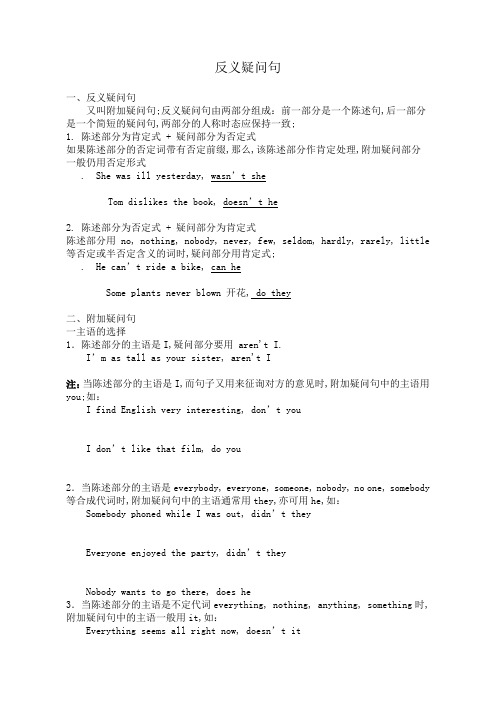
反义疑问句一、反义疑问句又叫附加疑问句;反义疑问句由两部分组成:前一部分是一个陈述句,后一部分是一个简短的疑问句,两部分的人称时态应保持一致;1.陈述部分为肯定式 + 疑问部分为否定式如果陈述部分的否定词带有否定前缀,那么,该陈述部分作肯定处理,附加疑问部分一般仍用否定形式. She was ill yesterday, wasn’t sheTom dislikes the book, doesn’t he2.陈述部分为否定式 + 疑问部分为肯定式陈述部分用 no, nothing, nobody, never, few, seldom, hardly, rarely, little 等否定或半否定含义的词时,疑问部分用肯定式;. He can’t ride a bike, can heSome plants never blown 开花, do they二、附加疑问句一主语的选择1.陈述部分的主语是I,疑问部分要用 aren't I.I’m as tall as your sister, aren't I注:当陈述部分的主语是I,而句子又用来征询对方的意见时,附加疑问句中的主语用you;如:I find English very interesting, don’t youI don’t like that film, do you2.当陈述部分的主语是everybody, everyone, someone, nobody, no one, somebody 等合成代词时,附加疑问句中的主语通常用they,亦可用he,如:Somebody phoned while I was out, didn’t theyEveryone enjoyed the party, didn’t theyNobody wants to go there, does he3.当陈述部分的主语是不定代词everything, nothing, anything, something时,附加疑问句中的主语一般用it,如:Everything seems all right now, doesn’t itNothing is kept in good order, is itSomething must be done to stop pollution, isn’t it4.当陈述部分的主语是指示代词this, that或these, those时,附加疑问句中的主语分别用it和they,如:This is important, isn’t itThat isn’t correct, is itThese are your friends Tom and Jack, aren’t they5.如果陈述部分是以代词one作主语,附加疑问句中的主语在正式场合用one,非正式场合下可以用you或he,如:One can’t be too careful, can one或can youOne should do his duty, shouldn’t he6.当陈述句为there be结构时,附加疑问句中的主语也用there;如:There’s no help for it, is thereThere’s something wrong, isn’t there7.当陈述部分为主从复合句时,附加疑问部分一般应与主句的主语和谓语动词保持对应关系;如:She says that I did it, doesn’t sheI told them not everybody could do it ,didn’t I但当陈述部分的主语是I,谓语是think, believe, suppose, expect这类动词时,附加疑问部分则往往与从句中的主语和谓语动词保持对应关系,但要注意否定的转移;I suppose that he’s serious isn’t heI don’t think she cares, does she8.当陈述部分是并列句,附加疑问句则需和就近的分句的主语和谓语一致;如:Xiao Lin has been writing letters all afternoon but he should finish them now, shouldn’t he9.在由“祈使句+附加疑问”构成的附加疑问句中,附加疑问部分的主语一般用you;如:Don’t open the door, will youGive me some cigarettes, can youTake a rest, why don’t you但以let’s开头的祈使句,附加疑问部分用shall we;以let us开头的祈使句,如果含义是allow us,不包括听话人在内,疑问部分用will you;如:Let’s have a basketball match this afternoon, shall weLet us go out for a rest, will you10.陈述句子中的主语为动词不定式短语、动名词短语或其他短语时,疑问部分的主语通常用it;如:Learning how to repair motors takes a long time, doesn’t itBetween six and seven will suit you, won’t itWhere to hold the meeting has not been decided, has it二谓语动词的选择1.当陈述部分带有情态动词must表示“必须”时,疑问部分用mustn’t;如:You must work hard next term, mustn’t youI must answer the letter, mustn’t I但若表推测这层含义时,不能用must,而要根据陈述部分的不定式结构即must之后的动词以及含义采用相应的动词形式;如:You must have made a mistake, haven’t youThey must have seen the film last week, didn’t theyHe must be in the library, isn’t he2.当陈述部分含有used to时,疑问部分可用usedn’t或didn’t;如:The old man used to smoke, didn’t /usedn’t heTom used to live here, usedn’t /didn’t he3.当陈述部分带有情态动词ought to时,疑问部分用oughtn’t或shouldn’t;如:He ought to know the answer, oughtn’t heWe ought to read this book, oughtn’t/ shouldn’t we4.当陈述部分含有情态动词dare或need时,疑问部分常用 need /dare +主语;We need not do it again, need weHe dare not say so, dare you但当dare, need 为实义动词时,疑问部分用助动词do + 主语;She doesn't dare to go home alone, does she5.当陈述部分含有had better时,疑问部分用hadn’t; 如:You’d better finish your homework now, hadn’t you6.感叹句后的附加疑问句的谓语动词需用be的现在时,且常用否定形式;如:What a clever boy, isn’t heWhat a lovely day, isn’t it7.陈述句中的谓语动词是wish,表示愿望时,附加疑问句用may,且用肯定形式;如:I wish to have a chance to learn English, may I8.当陈述部分带有表示“所有”含义的动词havehas时,疑问部分既可用have形式,也可用do形式;如:You have a new bike, haven’t you或don’t youShe doesn’t have any money in her pocket, does she9.陈述部分有have to +v. had to + v.,疑问部分常用don't +主语didn't +主语;如:We have to get there at eight tomorrow, don't we10.陈述部分有would rather +v.,疑问部分多用 wouldn't +主语;如:He would rather read it ten times than recite it, wouldn't he11.陈述部分有You'd like to +v. 疑问部分用wouldn't +主语;如:12.陈述部分由neither… nor, either… or 连接的并列主语时,疑问部分根据其实际逻辑意义而定;Neither you nor I am engineer, are we13.在口语和非正式文体中,为了加强语气,只是表示某种惊奇、怀疑、反感、讽刺等感情而并不是为了寻求回答,这时前后两部分的肯定、否定是一致的;如:Oh, he is a writer, is heYou’ll not go, won’t you三反义疑问句的回答对反意疑问句的回答,无论问题的提法如何,如果事实是肯定的,就用yes,事实是否定的,就要用no;例:—He likes playing football, doesn’t he 他喜欢踢足球,是吗—Yes, he does. / No, he doesn’t. 是的,他喜欢;/ 不是,他不喜欢;当陈述句部分是否定结构,附加疑问句部分用肯定式提问时,回答yes或no与汉语的意思正好相反;这种回答的yes要译成“不”,no要译成“是”;—His sister didn’t attend the meeting, did she 他妹妹没有参加会议,是吗—Yes, she did. / No, she didn’t. 不,她参加了;/ 是的,她没参加;反义疑问句练习1. Linda ate nothing this morning, ___A. didn’t sheB. was sheC. did sheD. wasn’t she2. There’s hardly___ milk in the bottle, _____thereA. no, isn’tB. some, isC. little, isn’tD. any, is3. He has never ridden a horse before, ___A. does heB. has heC. hasn’t heD. doesn’t he4. — He seldom came here, _____ — Yes sir.A. didn’t heB. does heC. doesn’t heD. did he5. Everything seems all right, _____A. does itB. don’t theyC. won’t itD. doesn’t itA. oneB. heC. itD. we8. No one failed in the exam, _____A. was heB. did oneC. did theyD. didn’t he10. Neither you nor I am a artist, _____A. am IB. aren’t weC. are weD. ain’t I11. He can’t be her father, _____ heA. isB. isn’tC. canD. can’t12. They have no time to visit the museum, _____A. do theyB. haven’t theyC. don’t theyD. will they14. You’d better go at once, _____ youA. hadn’tB. didC. didn’tD. don’t15. You’d rather work than play, _____ youA. hadn’tB. wouldn’tC. didn’tD. mustn’t16. You dare not do that, _____ youA. don’tB. doC. dareD.daren’t18. He dislikes the two subjects, _____ heA. doesB. doesn’tC. isD.isn’t19. These tools are useless now, _____A. are theyB. aren’t theyC. is itD. isn’t it20. He used to get up at 6:30, _____ heA. didn’t heB. did heC. used heD. wouldn’t heA. mustn’tB. oughtn’tC. shouldn’tD. Both B and C.23. Let’s go there by bus, ___A. will youB. shall weC. don’t youD. will you24. Let us go to play football, ___A. will youB. shall weC. do weD. are we25. Don’t forget to give Polly some food and change her water, ___A. will youB. shall weC. won’t youD. do you26. —Let’s go shopping this afternoon, _____ — All right.A. will weB. shall weC. don’t weD. are we27. — Pass me the dictionary, _____— Yes, with pleasure.A. would youB. will youC. won’t youD. wouldn’t you30. There is little water in the glass, ____A. isn’t thereB. isn’t itC. is itD. is there32. There won’t be any concert this Saturday evening, _____A. will there notB. will thereC. is thereD. won’t33. — I guess she taught herself Japanese, ______ — Yes.A. don’t IB. did sheC. do ID. didn’t she34. I don’t believe you are right, _____A. are youB. do youC. won’t youD. do35. She doesn’t think that Tom sings best in the class, _____A. does sheB. doesn’t sheC. does heD. doesn’t he37. I know you didn’t want to hurt me, _____A. did youB. didn’t youC. do ID. don’t I38. If my father were here, he would be very happy, _____A. weren’t heB. were heC. wouldn’t heD. would he。
英语语法:反义疑问句专项讲解
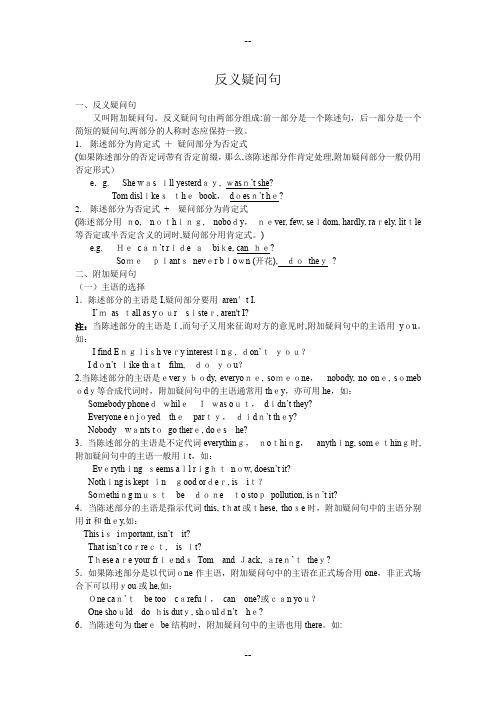
反义疑问句一、反义疑问句又叫附加疑问句。
反义疑问句由两部分组成:前一部分是一个陈述句,后一部分是一个简短的疑问句,两部分的人称时态应保持一致。
1.陈述部分为肯定式+疑问部分为否定式(如果陈述部分的否定词带有否定前缀,那么,该陈述部分作肯定处理,附加疑问部分一般仍用否定形式)e.g.She was ill yesterday, wasn’t she?Tom dislikesthebook,doesn’t he?2.陈述部分为否定式+疑问部分为肯定式(陈述部分用no,nothing,nobody,never, few, seldom, hardly, rarely, little 等否定或半否定含义的词时,疑问部分用肯定式。
)e.g.Hecan’t ride abike, can he?Someplantsnever blown (开花),dothey?二、附加疑问句(一)主语的选择1.陈述部分的主语是I,疑问部分要用aren't I.I’mas tall as your sister, aren't I?注:当陈述部分的主语是I,而句子又用来征询对方的意见时,附加疑问句中的主语用you。
如:I find English very interesting, don’tyou?I don’t like that film,doyou?2.当陈述部分的主语是everybody, everyone, someone,nobody, no one, someb ody等合成代词时,附加疑问句中的主语通常用they,亦可用he,如:Somebody phonedwhileIwas out,didn’t they?Everyone enjoyed theparty,didn’t they?Nobody wants togo there, does he?3.当陈述部分的主语是不定代词everything,nothing,anything, something时,附加疑问句中的主语一般用it,如:Everything seems all rightnow, doesn’t it?Nothing is kept ingood order, is it?Something mustbedoneto stoppollution, isn’t it?4.当陈述部分的主语是指示代词this, that或these, those时,附加疑问句中的主语分别用it和they,如:This isimportant, isn’t it?That isn’t correct,is it?These are your friendsTom and Jack, aren’tthey?5.如果陈述部分是以代词one作主语,附加疑问句中的主语在正式场合用one,非正式场合下可以用you或he,如:One can’tbe too careful,can one?或can you?One should do his duty, shouldn’t he?6.当陈述句为therebe结构时,附加疑问句中的主语也用there。
英语语法反义疑问句专项讲解

反义疑问句一、反义疑问句又叫附加疑问句。
反义疑问句由两部分组成:前一部分是一个陈述句,后一部分是一个简短的疑问句,两部分的人称时态应保持一致。
1.陈述部分为肯定式+ 疑问部分为否定式(如果陈述部分的否定词带有否定前缀,那么,该陈述部分作肯定处理,附加疑问部分一般仍用否定形式)e.g. She was ill yesterday, wasn’t she?Tom dislikes the book, doesn’t he?2.陈述部分为否定式+ 疑问部分为肯定式(陈述部分用no, nothing, nobody, never, few, seldom, hardly, rarely, little等否定或半否定含义的词时,疑问部分用肯定式。
)e.g. He can’t ride a bike, can he?Some plants never blown (开花), do they ?二、附加疑问句(一)主语的选择1.陈述部分的主语是I,疑问部分要用aren't I.I’m as tall as your sister, aren't I?注:当陈述部分的主语是I,而句子又用来征询对方的意见时,附加疑问句中的主语用you。
如:I find English very interesting, don’t you?I don’t like that film, do you?2.当陈述部分的主语是everybody, everyone, someone, nobody, no one, somebody等合成代词时,附加疑问句中的主语通常用they,亦可用he,如:Somebody phoned while I was out, didn’t they?Everyone enjoyed the party, didn’t they?Nobody wants to go there, does he?3.当陈述部分的主语是不定代词everything, nothing, anything, something时,附加疑问句中的主语一般用it,如:Everything seems all right now, doesn’t it?Nothing is kept in good order, is it?Something must be done to stop pollution, isn’t it?4.当陈述部分的主语是指示代词this, that或these, those时,附加疑问句中的主语分别用it 和they,如:This is important, isn’t it?That isn’t correct, is it?These are your friends Tom and Jack, aren’t they?5.如果陈述部分是以代词one作主语,附加疑问句中的主语在正式场合用one,非正式场合下可以用you或he,如:One can’t be too careful, can one?或can you?One should do his duty, shouldn’t he?6.当陈述句为there be结构时,附加疑问句中的主语也用there。
反义疑问句详细讲解及习题及答案-反意疑问句-反义疑问句题目及答案解析【范本模板】
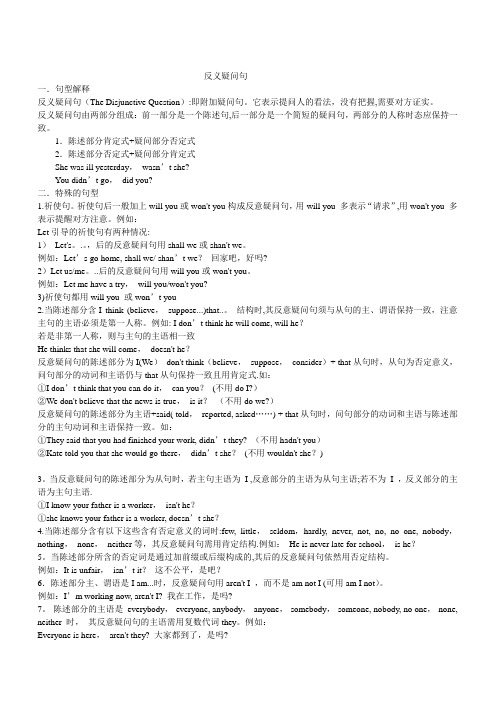
反义疑问句一.句型解释反义疑问句(The Disjunctive Question):即附加疑问句。
它表示提问人的看法,没有把握,需要对方证实。
反义疑问句由两部分组成:前一部分是一个陈述句,后一部分是一个简短的疑问句,两部分的人称时态应保持一致。
1.陈述部分肯定式+疑问部分否定式2.陈述部分否定式+疑问部分肯定式She was ill yesterday,wasn’t she?You didn’t go,did you?二.特殊的句型1.祈使句。
祈使句后一般加上will you或won't you构成反意疑问句,用will you 多表示“请求”,用won't you 多表示提醒对方注意。
例如:Let引导的祈使句有两种情况:1)Let's。
.。
,后的反意疑问句用shall we或shan't we。
例如:Let’s go home, shall we/ shan’t we?回家吧,好吗?2)Let us/me。
..后的反意疑问句用will you或won't you。
例如:Let me have a try,will you/won't you?3)祈使句都用will you 或won’t you2.当陈述部分含I think (believe,suppose...)that..。
结构时,其反意疑问句须与从句的主、谓语保持一致,注意主句的主语必须是第一人称。
例如: I don’t think he will come, will he?若是非第一人称,则与主句的主语相一致He thinks that she will come,doesn't he?反意疑问句的陈述部分为I(We)don't think(believe,suppose,consider)+ that从句时,从句为否定意义,问句部分的动词和主语仍与that从句保持一致且用肯定式.如:①I don’t think that you can do it,can you?(不用do I?)②We don't believe that the news is true,is it?(不用do we?)反意疑问句的陈述部分为主语+said( told,reported, asked……) + that从句时,问句部分的动词和主语与陈述部分的主句动词和主语保持一致。
反义疑问句讲解和练习(答案)

反义疑问句讲解和练习(答案)反意疑问句英语中的反意疑问句是由陈述句和附在其后的附加疑问句组成。
附加疑问句是对___所说的事实或观点提出疑问,起证实作用,一般用于证实说话者所说的事实或观点。
回答时,如果情况属实,用Yes加上反问句的倒装肯定句;若果情况不属实,则用No加上反问句的倒装否定句。
反意疑问句中问句部分的动词与陈述部分的动词在语气上成相反的对应关系,即:肯定+否定?否定+肯定?当陈述句中含有be动词,助动词,或是情态动词时,反问句部分由这些词加上主语人称代词构成。
例如:You can’t do it。
can you。
你不能做它,是吗?They are very late for the meeting。
___。
他们开会迟到了,是吗?She is a lovely girl。
isn’t she。
她是一个可爱的女孩,是吗?He will go home。
won’t he。
他要回家了,是吗?She doesn’t like to eat popcorn。
does she。
她不喜欢吃爆米花,是吗?The baby won’t sleep early。
will it。
小宝宝睡得不早,是吗?需要注意的是,当陈述句中含有have时,反问句部分不能用hasn’t he或don’t they,而应该用___。
例如:He has supper at home every day。
doesn’t he。
他每天在家吃晚饭,是吗?They have known the matter。
___。
他们已经知道那事情了,是吗?小试牛刀:It’s very hot today。
isn’t it?He can speak Chinese。
can’t he?It’s a good day for swimming。
isn’t it?Tom has been to Singapore。
hasn’t he?She doesn't like climbing hills。
史上最全最有方法的反义疑问句讲解及练习
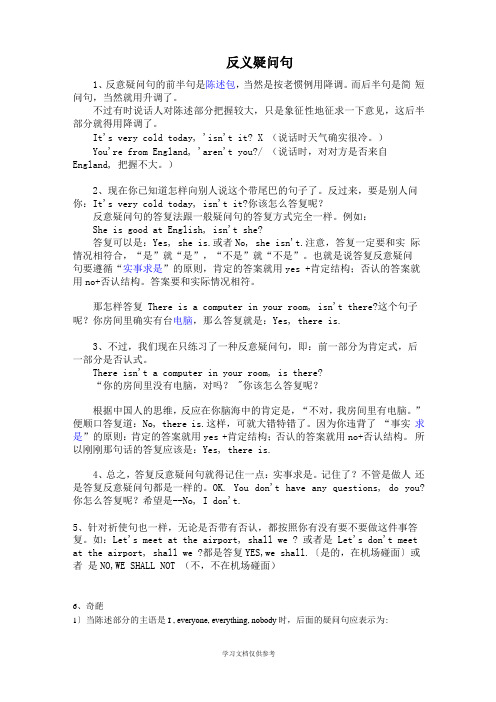
反义疑问句1、反意疑问句的前半句是陈述包,当然是按老惯例用降调。
而后半句是简短问句,当然就用升调了。
不过有时说话人对陈述部分把握较大,只是象征性地征求一下意见,这后半部分就得用降调了。
It's very cold today, 'isn't it? X (说话时天气确实很冷。
)You're from England, 'aren't you?/ (说话时,对对方是否来自England, 把握不大。
)2、现在你已知道怎样向别人说这个带尾巴的句子了。
反过来,要是别人问你:It's very cold today, isn't it?你该怎么答复呢?反意疑问句的答复法跟一般疑问句的答复方式完全一样。
例如:She is good at English, isn't she?答复可以是:Yes, she is.或者No, she isn't.注意,答复一定要和实际情况相符合,“是”就“是”,“不是”就“不是”。
也就是说答复反意疑问句要遵循“实事求是”的原则,肯定的答案就用yes +肯定结构;否认的答案就用no+否认结构。
答案要和实际情况相符。
那怎样答复 There is a computer in your room, isn't there?这个句子呢?你房间里确实有台电脑,那么答复就是:Yes, there is.3、不过,我们现在只练习了一种反意疑问句,即:前一部分为肯定式,后一部分是否认式。
There isn't a computer in your room, is there?“你的房间里没有电脑,对吗? "你该怎么答复呢?根据中国人的思维,反应在你脑海中的肯定是,“不对,我房间里有电脑。
” 便顺口答复道:No, there is.这样,可就大错特错了。
因为你违背了“事实求是”的原则:肯定的答案就用yes +肯定结构;否认的答案就用no+否认结构。
反义疑问句讲解及习题及答案

知识梳理句型解释1.陈述部分肯定式+疑问部分否定式可记为前肯后否2.陈述部分否定式+疑问部分肯定式可记为前否后肯主语一般词语附加疑问句中主语用和主语一致的主语,用主格。
不定代词当陈述部分的主语是( 1 )用one 时,后面的疑问句可用one/he.(2)everything,anything,nothing,something时,附加疑问句中主语用it 不用they(3)this,that,或those,these时,附加疑问句中主语用it和they.(4)everyone,everybody,someone,somebody等,附加疑问句中主语一般用he/they. (5)不定式,动名词,其他短语,附加疑问句中主语一般用it。
(6)在there be句型中,附加疑问句中主语一般用be/情态动词/助动词+there。
特殊句型否定意义的词否定意义的词(1)当陈述部分有never,seldom, hardly,few,little,barely, scarcely, nothing 等否定意义的词时,后面的反意疑问句则为肯定形式:There are few apples in the basket, are there?He can hardly swim, can he?They seldom come late, do they?(2)当陈述部分含有否定意思的词是unhappy,dislike,unfriendly等含有否定词缀的派生词,也就是有un-前缀、-less后缀等含有词缀而意思否定的词,当做肯定句处理,疑问部分要用否定形式。
如:He looks unhappy,doesn't he?他看上去不高兴,不是吗?The girl dislikes history,doesn't she?这女孩不喜欢历史,不是吗?有less,fewer等词视为肯定词,疑问部分用否定形式。
如:There will be less pollution, won't there?表示主语主观意愿的词含有think, believe, suppose, imagine, expect等动词后接宾语从句构成的主从复合句在构成反意疑问句时,视情况不同有两种不同的构成方式。
反义疑问句详细讲解及习题及答案-反意疑问句-反义疑问句题目及答案解析
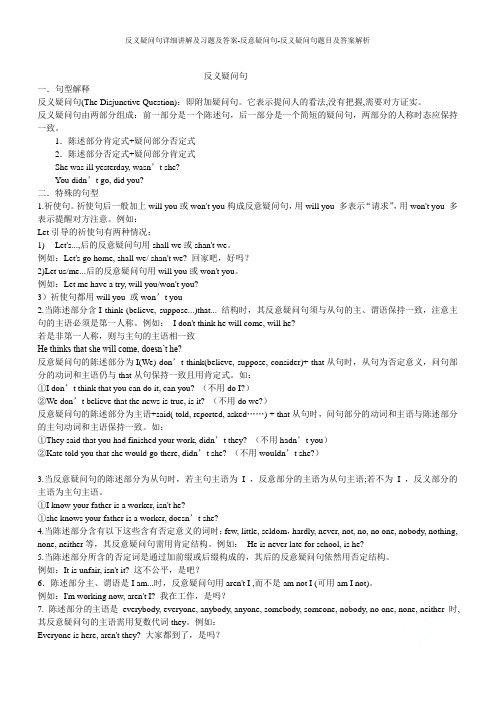
反义疑问句一.句型解释反义疑问句(The Disjunctive Question):即附加疑问句。
它表示提问人的看法,没有把握,需要对方证实。
反义疑问句由两部分组成:前一部分是一个陈述句,后一部分是一个简短的疑问句,两部分的人称时态应保持一致。
1.陈述部分肯定式+疑问部分否定式2.陈述部分否定式+疑问部分肯定式She was ill yesterday, wasn’t she?You didn’t go, did you?二.特殊的句型1.祈使句。
祈使句后一般加上will you或won't you构成反意疑问句,用will you 多表示“请求”,用won't you 多表示提醒对方注意。
例如:Let引导的祈使句有两种情况:1) Let's...,后的反意疑问句用shall we或shan't we。
例如:Let's go home, shall we/ shan't we? 回家吧,好吗?2)Let us/me...后的反意疑问句用will you或won't you。
例如:Let me have a try, will you/won't you?3)祈使句都用will you 或won’t you2.当陈述部分含I think (believe, suppose...)that... 结构时,其反意疑问句须与从句的主、谓语保持一致,注意主句的主语必须是第一人称。
例如:I don't think he will come, will he?若是非第一人称,则与主句的主语相一致He thinks that she will come, doesn’t he?反意疑问句的陈述部分为I(We) don’t think(believe, suppose, consider)+ that从句时,从句为否定意义,问句部分的动词和主语仍与that从句保持一致且用肯定式。
反义疑问句详细讲解及习题及答案

反义疑问句详细讲解及习题及答案文件排版存档编号:[UYTR-OUPT28-KBNTL98-UYNN208]反义疑问句一.句型解释反义疑问句(The Disjunctive Question):即附加疑问句。
它表示提问人的看法,没有把握,需要对方证实。
反义疑问句由两部分组成:前一部分是一个陈述句,后一部分是一个简短的疑问句,两部分的人称时态应保持一致。
1.陈述部分肯定式+疑问部分否定式2.陈述部分否定式+疑问部分肯定式She was ill yesterday, wasn’t sheYou didn’t go, did you二.特殊的句型1.祈使句。
祈使句后一般加上will you或won't you构成反意疑问句,用will you 多表示“请求”,用won't you 多表示提醒对方注意。
例如:Let引导的祈使句有两种情况:1) Let's...,后的反意疑问句用shall we或shan't we。
例如:Let's go home, shall we/ shan't we 回家吧,好吗2)Let us/me...后的反意疑问句用will you或won't you。
例如:Let me have a try, will you/won't you3)祈使句都用will you 或won’t you2.当陈述部分含I think (believe, suppose...)that... 结构时,其反意疑问句须与从句的主、谓语保持一致,注意主句的主语必须是第一人称。
例如: I don't think he will come, will he若是非第一人称,则与主句的主语相一致He thinks that she will come, doesn’t he反意疑问句的陈述部分为I(We) don’t think(believe, suppose, consider)+ that从句时,从句为否定意义,问句部分的动词和主语仍与that从句保持一致且用肯定式。
- 1、下载文档前请自行甄别文档内容的完整性,平台不提供额外的编辑、内容补充、找答案等附加服务。
- 2、"仅部分预览"的文档,不可在线预览部分如存在完整性等问题,可反馈申请退款(可完整预览的文档不适用该条件!)。
- 3、如文档侵犯您的权益,请联系客服反馈,我们会尽快为您处理(人工客服工作时间:9:00-18:30)。
反义疑问句一、反义疑问句又叫附加疑问句。
反义疑问句由两部分组成:前一部分是一个陈述句,后一部分是一个简短的疑问句,两部分的人称时态应保持一致。
1.陈述部分为肯定式+ 疑问部分为否定式(如果陈述部分的否定词带有否定前缀,那么,该陈述部分作肯定处理,附加疑问部分一般仍用否定形式)e.g. She was ill yesterday,wasn’t she?Tom dislikes the book,doesn’t he?2.陈述部分为否定式+ 疑问部分为肯定式(陈述部分用no,nothing,nobody,never,few,seldom,hardly,rarely,little等否定或半否定含义的词时,疑问部分用肯定式。
)e.g. He can’t ride a bike,can he?Some plants never blown (开花),do they ?二、附加疑问句(一)主语的选择1.陈述部分的主语是I,疑问部分要用aren't I.I’m as tall as your sister,aren't I?注:当陈述部分的主语是I,而句子又用来征询对方的意见时,附加疑问句中的主语用you。
如:I find English very interesting,don’t you?I don’t like that film,do you?2.当陈述部分的主语是everybody,everyone,someone,nobody,no one,somebody 等合成代词时,附加疑问句中的主语通常用they,亦可用he,如:Somebody phoned while I was out,didn’t they?Everyone enjoyed the party,didn’t they?Nobody wants to go there,does he?3.当陈述部分的主语是不定代词everything,nothing,anything,something时,附加疑问句中的主语一般用it,如:Everything seems all right now,doesn’t it?Nothing is kept in good order,is it?Something must be done to stop pollution,isn’t it?4.当陈述部分的主语是指示代词this,that或these,those时,附加疑问句中的主语分别用it和they,如:This is important,isn’t it?That isn’t correct,is it?These are your friends Tom and Jack,aren’t they?5.如果陈述部分是以代词one作主语,附加疑问句中的主语在正式场合用one,非正式场合下可以用you或he,如:One can’t be too careful,can one?或can you?One should do his duty,shouldn’t he?6.当陈述句为there be结构时,附加疑问句中的主语也用there。
如:There’s no help for it,is there?There’s something wrong,isn’t there?7.当陈述部分为主从复合句时,附加疑问部分一般应与主句的主语和谓语动词保持对应关系。
如:She says that I did it,doesn’t she?I told them not everybody could do it ,didn’t I?但当陈述部分的主语是I,谓语是think,believe,suppose,expect这类动词时,附加疑问部分则往往与从句中的主语和谓语动词保持对应关系,但要注意否定的转移。
I suppose that he’s serious isn’t he?I don’t think she cares,does she?8.当陈述部分是并列句,附加疑问句则需和就近的分句的主语和谓语一致。
如:Xiao Lin has been writing letters all afternoon but he should finish them now,shouldn’t he? 9.在由“祈使句+附加疑问”构成的附加疑问句中,附加疑问部分的主语一般用you。
如:Don’t open the door,will you?Give me some cigarettes,can you?Take a rest,why don’t you?但以let’s开头的祈使句,附加疑问部分用shall we;以let us开头的祈使句,如果含义是allow us,不包括听话人在内,疑问部分用will you。
如:Let’s have a basketball match this afternoon,shall we?Let us go out for a rest,will you?10.陈述句子中的主语为动词不定式短语、动名词短语或其他短语时,疑问部分的主语通常用it。
如:Learning how to repair motors takes a long time,doesn’t it?Between six and seven will suit you,won’t it?Where to hold the meeting has not been decided,has it?(二)谓语动词的选择1.当陈述部分带有情态动词must表示“必须”时,疑问部分用mustn’t。
如:You must work hard next term,mustn’t you?I must answer the letter,mustn’t I?但若表推测这层含义时,不能用must,而要根据陈述部分的不定式结构(即must之后的动词)以及含义采用相应的动词形式。
如:You must have made a mistake,haven’t you?They must have seen the film last week,didn’t they?He must be in the library,isn’t he?2.当陈述部分含有used to时,疑问部分可用usedn’t或didn’t。
如:The old man used to smoke,didn’t /usedn’t he?Tom used to live here,usedn’t /didn’t he?3.当陈述部分带有情态动词ought to时,疑问部分用oughtn’t或shouldn’t。
如:He ought to know the answer,oughtn’t he?We ought to read this book,oughtn’t/ shouldn’t we?4.当陈述部分含有情态动词dare或need时,疑问部分常用need /dare +主语。
We need not do it again,need we ?He dare not say so,dare you?但当dare,need 为实义动词时,疑问部分用助动词do + 主语。
She doesn't dare to go home alone,does she?5.当陈述部分含有had better时,疑问部分用hadn’t。
如:You’d better finish your homework now,hadn’t you?6.感叹句后的附加疑问句的谓语动词需用be的现在时,且常用否定形式。
如:What a clever boy,isn’t he?What a lovely day,isn’t it?7.陈述句中的谓语动词是wish,表示愿望时,附加疑问句用may,且用肯定形式。
如:I wish to have a chance to learn English,may I?8.当陈述部分带有表示“所有”含义的动词have(has)时,疑问部分既可用have形式,也可用do形式。
如:You have a new bike,haven’t you(或don’t you)?She doesn’t have any money in her pocket,does she?9.陈述部分有have to +v. (had to + v.),疑问部分常用don't +主语(didn't +主语)。
如:We have to get there at eight tomorrow,don't we?10.陈述部分有would rather +v.,疑问部分多用wouldn't +主语。
如:He would rather read it ten times than recite it,wouldn't he?11.陈述部分有You'd like to +v. 疑问部分用wouldn't +主语。
如:You'd like to go with me,wouldn't you?12.陈述部分由neither… nor,either… or 连接的并列主语时,疑问部分根据其实际逻辑意义而定。
Neither you nor I am engineer,are we?13.在口语和非正式文体中,为了加强语气,只是表示某种惊奇、怀疑、反感、讽刺等感情而并不是为了寻求回答,这时前后两部分的肯定、否定是一致的。
如:Oh,he is a writer,is he?You’ll not go,won’t you?(三)反义疑问句的回答对反意疑问句的回答,无论问题的提法如何,如果事实是肯定的,就用yes,事实是否定的,就要用no。
例:—He likes playing football,doesn’t he? 他喜欢踢足球,是吗?—Yes,he does. / No,he doesn’t. 是的,他喜欢。
/ 不是,他不喜欢。
当陈述句部分是否定结构,附加疑问句部分用肯定式提问时,回答yes或no与汉语的意思正好相反。
这种回答的yes要译成“不”,no要译成“是”。
—His sister didn’t attend the meeting,did she? 他妹妹没有参加会议,是吗?—Yes,she did. / No,she didn’t. 不,她参加了。
/ 是的,她没参加。
反义疑问句练习1. Linda ate nothing this morning,___?家庭是幼儿语言活动的重要环境,为了与家长配合做好幼儿阅读训练工作,孩子一入园就召开家长会,给家长提出早期抓好幼儿阅读的要求。
